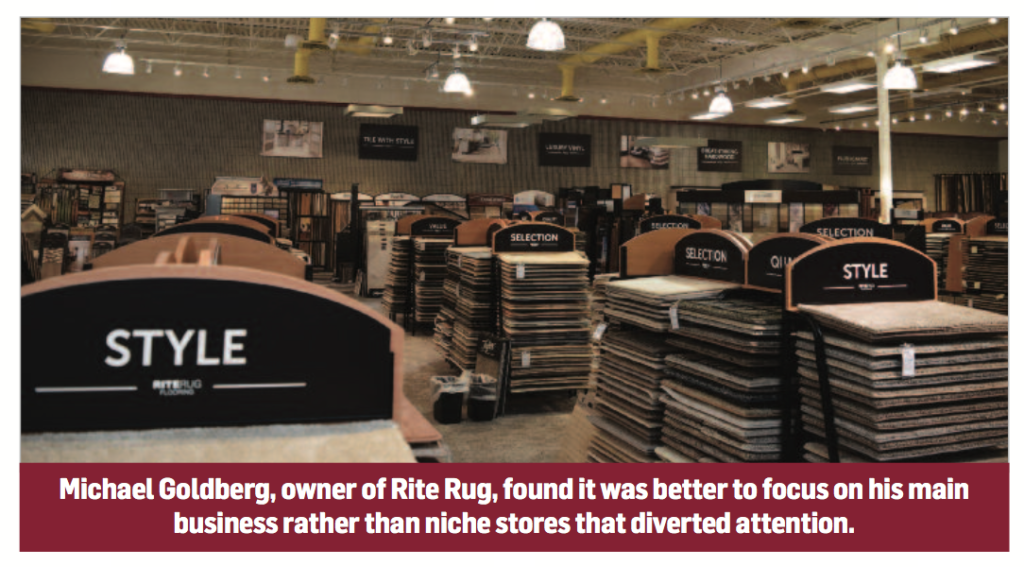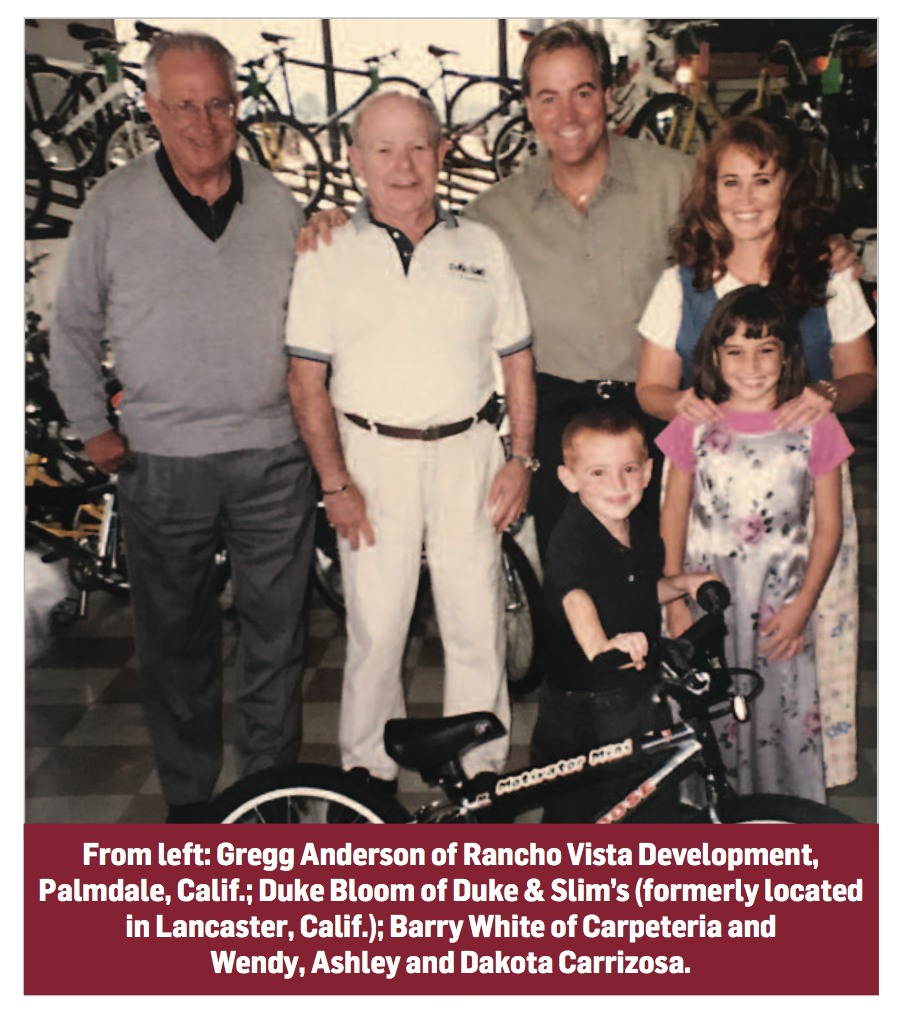January 21/28, 2019: Volume 34, Issue 17
By K.J. Quinn
 When you operate a small business, bad breaks are inevitable. Sometimes, the best-laid plans are offset by unforeseen circumstances. When you consider the shakeout in retail the last two years as stores closed by the thousands and shopping malls became ghost towns, one misfortune can lead to disaster.
When you operate a small business, bad breaks are inevitable. Sometimes, the best-laid plans are offset by unforeseen circumstances. When you consider the shakeout in retail the last two years as stores closed by the thousands and shopping malls became ghost towns, one misfortune can lead to disaster.
FCNews recently spoke with six retailers who overcame adversity and found a silver lining along the path to recovery.
Finding inner strength following a lossIt’s hard enough to succeed in retail when economic conditions are good, but dealing with the loss of a loved one makes it extremely challenging for anyone to focus on their job. Business becomes secondary as a family mourns and comforts one another during this difficult time.
This was the situation Shiva Etessam faced in 2005 when her husband died from a heart attack at age 53. “My break wasn’t only losing my business partner but losing the love of my life and father of my children,” Etessam, CEO of Abbey Design Center, Sterling, Va., recalled.
The passing was not only a shock to the family, but also to the business Etessam and her husband founded in 1989. “It goes without saying the immense personal and professional impact of losing him almost paralyzed my life,” she said.
The tragedy occurred during a critical time in the Etessams’ personal and professional lives. “He passed away when our oldest son was turning 21, our younger son was graduating from high school and we had started to build our 11,000-square-foot-showroom,” she said. “I realized if I lost my focus we could lose it all.”
Sometimes a personal tragedy can help individuals discover their true inner strength. “I guess the best thing was to realize if you dig deep, you will find you have much more will and enthusiasm in you for life—and for those you love—than you think,” Etessam said. “I was not going to let the business my husband and I worked so hard to build go down.”
So, with the unwavering support of employees, family and friends, Etessam began to pick up the pieces of her life. The showroom construction at the retailer’s flagship location was completed, and the business expanded into the remodeling and commercial sectors. “We bought another building for our second showroom in 2010, and all this happened in the downtime of the economy from 2008 to 2013,” Etessam said. “It was challenging to say the least.”
From a personal standpoint, Etessam went on to help her sons, Ali and Amir, through college. Her oldest son, Ali, became an attorney and now serves as president of the company while Amir is a senior business analyst. “I am hoping someday soon Amir joins the family business when he is ready,” she said.
Sometimes bigger is not always betterHistory has shown that as dealers expand they often take on more than they can chew. In the early 1990s, Michael Goldberg, owner of Rite Rug, operated a separate company called Brandon’s, which sold area rugs exclusively in an upscale, downtown shopping area in Columbus, Ohio. “It was a big venture, built out, and merchandising, marketing and inventory were all very complicated,” Goldberg recalled.
Operating a separate retail store brand required investments in, among other things, manpower and resources. “Ultimately, much of my staff spent a lot of time and energy focusing on the store and it distracted us from concentrating on our primary business,” Goldberg said. “We ended up closing the store when our lease was up about five years later.”
Goldberg admits the venture failed largely because it did not receive the proper attention required from company management. At the same time, he said it  created a renewed opportunity to refocus on the Rite Rug business. “What I learned was to stay focused on what you know. Try new opportunities, but make sure they are relevant to your business. Also, make sure your staff buys in.”
created a renewed opportunity to refocus on the Rite Rug business. “What I learned was to stay focused on what you know. Try new opportunities, but make sure they are relevant to your business. Also, make sure your staff buys in.”
There are countless examples of dealers who suffered bad breaks which, down the road, turned into blessings in disguise. At the same time, there are instances when store operators invest time and resources to support a charity, a worthy cause or a person in need without expecting anything in return.
Barry White, owner of Carpeteria, Lancaster, Calif., recalled two instances in which charitable acts by his company led to sales opportunities he never would have expected. First, when a couple entered the store seeking assistance for new flooring for a home they were purchasing in Colorado. “The husband was being transferred from his job and told me no local store would help them out because they were moving,” White said. “We showed them carpet and wood, I wrote up an estimate and had free samples sent to their house. It only took about an hour to provide what they needed.”
About a month later, the couple came back to Carpeteria to purchase flooring. “It turned out the husband didn’t get the job and he came back and bought $12,000 worth of flooring,” White said. “He said, ‘You’ve got the job, just give us a good deal.’”
Another incident occurred about 10 years ago. White recalled hearing about a child who had his bicycle stolen from his garage. The family could not afford to purchase a new bike for their son, so White offered to help out.
“The kid, Dakota, was just heartbroken,” White recalled. “I wanted to instill in him that this world has a lot of nice people and offered to buy him any bike he wanted. He was 8 years old at the time. When Dakota turned 19, he bought his first home and came to see us to buy his flooring.”
Build it, they will comeRelocating a store can be beneficial but is also fraught with risks. There are logistical and operational roadblocks that must be navigated to avoid a business disruption, minimize moving expenses and reduce the inconvenience to employees and customers.
These were among the obstacles facing Grigsby’s Carpet, Tile & Hardwood in 2005, when it made the decision to relocate from a building it occupied in Tulsa, Okla., since 1963. “It’s a decision we struggled with for a long time,” said Penny Carnino, director of operations. “It totally disrupts your business for sure.”
While the move went fairly smooth and the new location was less than a mile away, most employees thought it was a bad idea. “They just didn’t like change,” she said.
The rationale behind the move was twofold. “We didn’t own the building and the owner never sold it,” Carnino explained. “The old store wasn’t as conducive to shopping for everything, and the new store has made that much easier.”
The proof is in the pudding, as customers poured into the new store anxious to check out the refurbished building, which Grigsby’s now owns. The store increased its footprint by 25% to 16,000 square feet, which provided valuable real estate for the company to expand. “The extra space is designated for the commercial area and some separate offices,” Carnino said. “It also allows us to show all products, mostly in the main showroom area. Our business increased tremendously, about 30%, since moving to the new location. It turned out great for us.”
Fast sales growth is just as dangerous as no growthThe early 1990s saw many flooring retailers expand their geographical footprints through acquisitions or opening new locations. During this time, Carpet Exchange expanded from one to nine locations in a four-year period, which, in retrospect, was a case of trying to grow the business too fast.
“The old saying, ‘If you have that much volume, it takes a lot more time to float that boat,’ turned out to be true,” recalled Clyde Cumbie, owner of the Dallas-based store. “I refer to those years as ‘management by crisis.’ The additional volume was not the answer for poor management decisions.”
The additional stores, opened between 1990 and 1994, combined with the flagship location generated about $1 million in monthly sales. However, accelerated growth can be just as dangerous as no growth at all. As time went by, Cumbie found the stores lacked the proper infrastructure to support the business.
“The bigger you grow, the more overhead and inefficiencies you have,” he said. “We had too many managers, too many crews and made too many mistakes, and it just got out of hand. At the end of the day, the return was not worth the effort.”
Cumbie caught a break when he came across someone who expressed interest in purchasing his business. “I will say the Lord blessed me and someone bought eight of the stores and left me with one,” he said. “He wrote me a big check and the bleeding was over.”
The transaction enabled Cumbie to focus his efforts on managing a single location. The move paid immediate dividends as Carpet Exchange sales grew to the point where it represented nearly two-thirds the volume of the other eight stores combined. The dealer now operates a leaner operation, which enables the store to be more profitable and keeps management and employees focused.
New selling operations help offset loss of top performersSalespeople often come and go in retail. When a bad one leaves, store owners might not care. However, when your best performers depart, it can be a huge blow to the business.
Tom Garvey, owner of Garvey’s Flooring America, Northumberland, Pa., knows this all too well, as he lost his two best salespeople to other industries within a period of three months. “Sales volume dropped quickly, and it takes time for a new salesperson to ramp up to producing volume,” he explained. “The length of time it takes to hire and train in our industry is tough.”
Losing a top performer is often three times or more their annual salary, according to hiring experts. The cost is even greater when you factor in hiring fees, training expenses, lost sales and time spent by management to find adequate replacements. However, an even greater challenge for Garvey’s was accelerating the learning curve.
“We had to find a way to make learning the industry faster and easier for staff,” Garvey recalled.
The store owner began by evaluating the selling systems utilized by the sales team to determine how they could be utilized more effectively. “We hired RFMS as consultants to be sure we were using our system in the most efficient way possible,” Garvey noted. “This has streamlined our process in the sales department and operations as well.”
RFMS, a business software provider for the flooring industry, provided valuable support to help Garvey’s improve the productivity and efficiency of its sales staff while building their confidence in utilizing the store’s updated selling system. For example, the retailer implemented order entry using an iPad, which made the process simpler and faster. “The insight we have received from Terry Wheat and his consultant, Don Kilbourne, have been highly beneficial,” Garvey said.
As a result, the turnaround time for order processing got faster, which contributed to the store increasing volume following the departure of its top two sales reps. “We have committed to investing in ongoing training and technology,” Garvey said. “We will continue working with RFMS to improve all areas of our business.”
